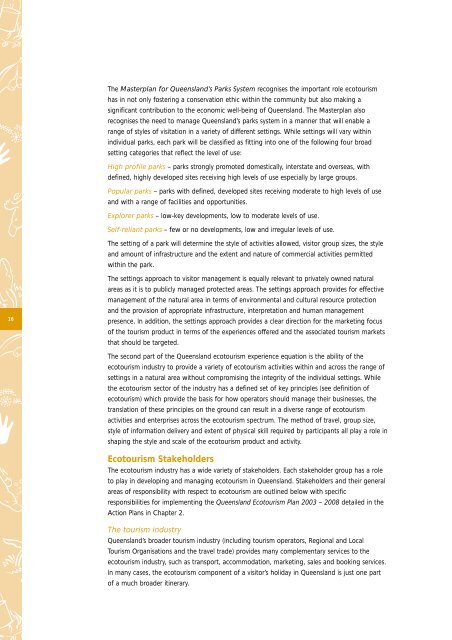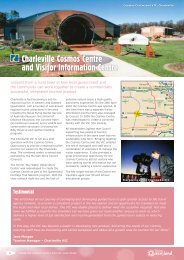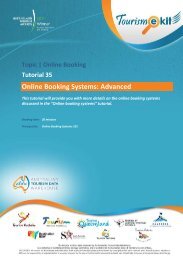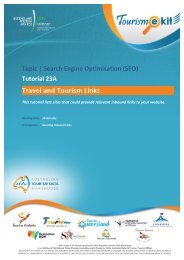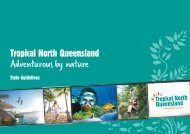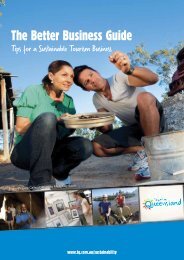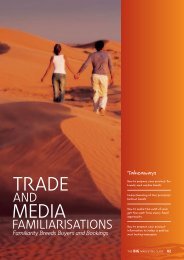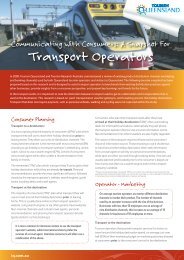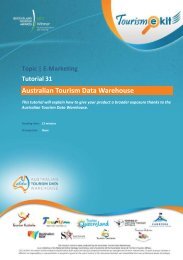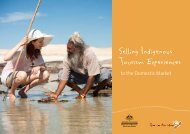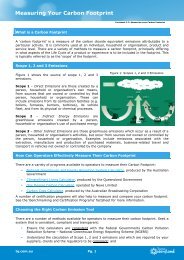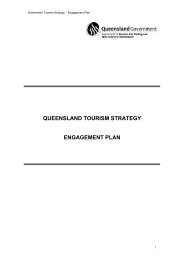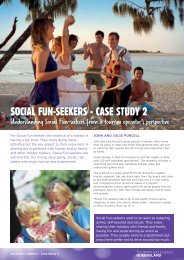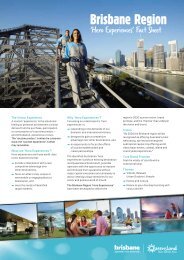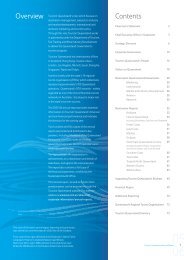Queensland Ecotourism Plan 2003-2008 - Tourism Queensland
Queensland Ecotourism Plan 2003-2008 - Tourism Queensland
Queensland Ecotourism Plan 2003-2008 - Tourism Queensland
You also want an ePaper? Increase the reach of your titles
YUMPU automatically turns print PDFs into web optimized ePapers that Google loves.
The Masterplan for <strong>Queensland</strong>’s Parks System recognises the important role ecotourism<br />
has in not only fostering a conservation ethic within the community but also making a<br />
significant contribution to the economic well-being of <strong>Queensland</strong>. The Masterplan also<br />
recognises the need to manage <strong>Queensland</strong>’s parks system in a manner that will enable a<br />
range of styles of visitation in a variety of different settings. While settings will vary within<br />
individual parks, each park will be classified as fitting into one of the following four broad<br />
setting categories that reflect the level of use:<br />
High profile parks – parks strongly promoted domestically, interstate and overseas, with<br />
defined, highly developed sites receiving high levels of use especially by large groups.<br />
Popular parks – parks with defined, developed sites receiving moderate to high levels of use<br />
and with a range of facilities and opportunities.<br />
Explorer parks – low-key developments, low to moderate levels of use.<br />
Self-reliant parks – few or no developments, low and irregular levels of use.<br />
The setting of a park will determine the style of activities allowed, visitor group sizes, the style<br />
and amount of infrastructure and the extent and nature of commercial activities permitted<br />
within the park.<br />
16<br />
The settings approach to visitor management is equally relevant to privately owned natural<br />
areas as it is to publicly managed protected areas. The settings approach provides for effective<br />
management of the natural area in terms of environmental and cultural resource protection<br />
and the provision of appropriate infrastructure, interpretation and human management<br />
presence. In addition, the settings approach provides a clear direction for the marketing focus<br />
of the tourism product in terms of the experiences offered and the associated tourism markets<br />
that should be targeted.<br />
The second part of the <strong>Queensland</strong> ecotourism experience equation is the ability of the<br />
ecotourism industry to provide a variety of ecotourism activities within and across the range of<br />
settings in a natural area without compromising the integrity of the individual settings. While<br />
the ecotourism sector of the industry has a defined set of key principles (see definition of<br />
ecotourism) which provide the basis for how operators should manage their businesses, the<br />
translation of these principles on the ground can result in a diverse range of ecotourism<br />
activities and enterprises across the ecotourism spectrum. The method of travel, group size,<br />
style of information delivery and extent of physical skill required by participants all play a role in<br />
shaping the style and scale of the ecotourism product and activity.<br />
<strong>Ecotourism</strong> Stakeholders<br />
The ecotourism industry has a wide variety of stakeholders. Each stakeholder group has a role<br />
to play in developing and managing ecotourism in <strong>Queensland</strong>. Stakeholders and their general<br />
areas of responsibility with respect to ecotourism are outlined below with specific<br />
responsibilities for implementing the <strong>Queensland</strong> <strong>Ecotourism</strong> <strong>Plan</strong> <strong>2003</strong> – <strong>2008</strong> detailed in the<br />
Action <strong>Plan</strong>s in Chapter 2.<br />
The tourism industry<br />
<strong>Queensland</strong>’s broader tourism industry (including tourism operators, Regional and Local<br />
<strong>Tourism</strong> Organisations and the travel trade) provides many complementary services to the<br />
ecotourism industry, such as transport, accommodation, marketing, sales and booking services.<br />
In many cases, the ecotourism component of a visitor’s holiday in <strong>Queensland</strong> is just one part<br />
of a much broader itinerary.


